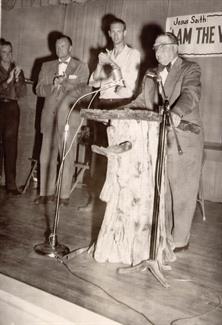FCA 101: Camps
As we seek to make disciples who make disciples, we engage, equip and empower coaches and athletes to know and grow in Christ and to lead others to do the same. We do this through many different ways and environments. We identify spaces and places to cultivate relationships, individually or in groups; and we use Christ-centered Camps, events, Huddles, training, resources and ongoing support.
WHAT ARE FCA CAMPS?
FCA Camps are a time of “inspiration and perspiration.” Combining some of the best attributes of an athletic camp and a spiritual camp into an experience like none other, FCA Camps help coaches and athletes step away from their routines. They enter environments created for training and encouraging them both in their sports and their relationships with Christ.
 WHEN DID FCA CAMPS BEGIN?
WHEN DID FCA CAMPS BEGIN?
FCA hosted its first Camp, then called a national Conference, at Estes Park, Colorado, in 1956. With 256 coaches and student-athletes in attendance, Branch Rickey (pictured left), who helped Don McClanen found FCA in 1954, gave the keynote message calling for a bold witness for Jesus Christ and the church through the first Camp theme, “I Am the Way, the Truth and the Life” from John 14:6.
HOW DID WE GET TO TODAY’S CAMPS?
Following our first FCA Conference, we added more conferences in Lake Geneva, Wisconsin; Ashland, Oregon; and Henderson Harbor, New York; as well as Blue Ridge Assembly in Black Mountain, North Carolina, in 1964. In 1968, FCA hosted its first Coaches Conference at Estes Park, along with two national women’s Camps in 1974—one at the National Training Center near Marshall, Indiana, and the other at a Camp built by FCA in 1972 and 1973. Forty years after FCA Camps began, we’d reached more than 13,000 campers. In 50 years, we’d grown to reach more than 33,000 campers at 117 Camps. Now, after more than 60 years, we’ve reached 88,000 coaches and student-athletes through 771 Camps worldwide.
WHAT ARE THE DIFFERENT TYPES OF CAMPS?
FCA now offers six types of Camps in the U.S. and around the world.
Sports Camp: Brings coaches and athletes together with instruction, skill development and competition to prepare athletes physically, mentally and spiritually for future competition.
Leadership Camp: Trains student-athletes, Huddle coaches and volunteers to be spiritual leaders in their personal lives, on their teams, on their campuses, and in their communities.
Coaches Camp: Equips, encourages and ministers to coaches in their faith and family life.
Power Camp: Develops younger athletes, typically ages 8 through 12, in their faith and sport.
Team Camp: Equips teams with spiritual principles through competition where they voluntarily come together.
Partnership Camp: Develops relationships with existing camps to provide the spiritual or athletic program elements.
-FCA-